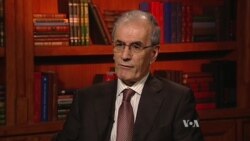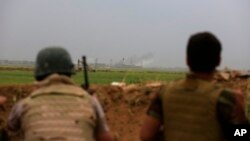The governor of an Iraqi province where the Islamic State terror group has seized territory says although there has been progress in pushing back IS-fighters over the past year, militants still retain control of some areas, and government forces are facing difficulties in keeping IS-fighters at bay.
Najmaldin Karim, the Kurdish governor of Kirkuk, is visiting Washington this week, appealing to U.S. officials to help bolster the fight against the group and asking for more assistance for the crippled Kurdish economy. He told VOA that although parts of Kirkuk province remain under the control of IS, one town in particular has become key to the group's operations.
“Hawija is the source of terrorist activities in the entire region,” he said.
“Liberating Hawija would help attempts to liberate Mosul [from IS militants],” Karim said, referring the IS’s stronghold in northern Iraq.
Hawija, located nearly 50 kilometers southwest of Kirkuk, has been held by IS since 2014. In late 2015, U.S. and Kurdish commandos conducted a joint raid on an IS prison in Hawija, freeing about 70 hostages, killing a number of militants and capturing others.
"We emphasize that the fight against Daesh required a unified front… and cooperation between all the neighboring countries," Karim said, using the Arabic name for IS. "We’d like to see what their (the U.S.) approach is towards fighting Daesh."
Iraqi divisions spell trouble for anti-IS fight
Last month, the United States responded to Kurdish appeals by providing $415 million to help cover the shortfall in Kurdish fighters' salaries. The Kurdistan Regional Government has been struggling with a financial crisis, in part brought on by plummeting oil prices. But those funds could raise tensions with Baghdad, which has long been at odds with the Kurdish government over its aims of autonomy.
“It is crucial that [the U.S.] monitors the distribution of those funds and ensures that they reach the Peshmerga fighters on the frontlines against IS,” said Nussaibah Younis, a researcher at the Atlantic Council, a Washington-based think tank.
The tensions over such funds highlight how the push for a united front against IS is complicated by Iraq's ethnic and sectarian divisions.
Karim, who administers the province under control of the Iraqi government, symbolizes the dilemma for Washington. Karim is an ethic Kurd and is influential in pursuing Kurdish agendas. Kirkuk is a disputed area politically and is made up of Kurds, Arabs and Turkmen. Since 2014, it has been protected by Kurdish forces.
The country has long been divided along sectarian lines, including Kurdish, Sunni and Shi'ite. But now, there are fissures even within particular groups, leading some observers to suggest it may be even more difficult for Baghdad to have a unified government any time soon.
"They've got a lot on their plate," U.S. President Barack Obama said last month of the Iraqi lawmakers. "Now is not the time for government gridlock or bickering."
The Kirkuk governor told VOA that Iraq’s political issues make a unified fight against IS more difficult.
“The division between Shi’ites and Sunnis exists,” Karim told VOA. “We have a weakened government in Baghdad. So these issues need to be straightened out.”










